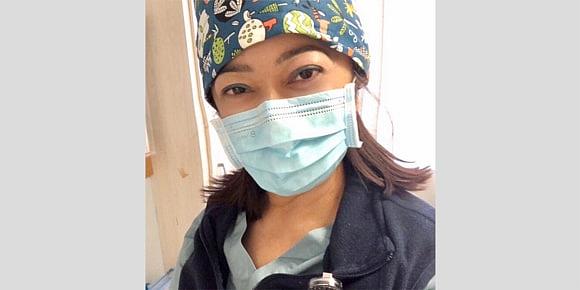Part 1: Filipino American nurses, reflecting on disproportionate Covid toll, look ahead
This is the first story in a three-part NBC Asian America series, “The Impact of Covid-19 on Filipino Americans,” supported by the University of Southern California Annenberg Center for Health Journalism 2020 Data Fellowship.
Her other stories include:
Part 2: 85% of Filipino Americans reported Covid mental health issues, more than any Asian group
Part 3: To address Filipino American health disparities in future, experts look to past inequality

Courtesy Catherine Rubio
LOS ANGELES — Catherine Rubio had planned on retiring from a 30-year full-time nursing career in the second half of 2020.
But shortly after stay-at-home orders were issued in Los Angeles County because of the coronavirus pandemic, she decided to leave her full-time job in July and work in the field part time.
She remembers struggling — especially in the earlier months of the crisis — with the possibility of contracting the disease because of her exposure to it on the job.
“It was challenging, because, of course, I was afraid of if I get it, how would I survive this? Then I will be leaving my family behind,” said Rubio, president of the West Los Angeles subchapter of the Philippine Nurses Association of Southern California. “There was a lot of fear and anxiety.”
Catherine Rubio, president of the Philippine Nurses Association of Southern California - West Los Angeles subchapter.Courtesy Catherine Rubio
Her decision to leave sooner than she had planned was largely rooted in a shift in her perspective while she worked during the pandemic. As she cared for Covid-19 patients who didn't have families or were uninsured or homeless, she thought about how fortunate she was to be worrying about others rather than herself. She also had to care for her elderly parents, who are at risk of severe illness if they contract Covid-19.
“I needed to prioritize what's important now, and I have the opportunity to be with my family,” she said.
As the country turns the corner on the pandemic, with more people getting vaccinated and cities reopening, Filipino American nurses, who account for nearly one-fifth of nurses in California, spoke with NBC Asian America about the emotional and physical toll it has taken, how the experience affected decisions about their careers, families and health — and how they ultimately feel a sense of resilience and optimism.
Filipino Americans have been highlighted in the media throughout the past year because, while they are 4 percent of registered nurses nationwide, they account for about 25 percent of registered nurses who have died of Covid-19, according to data the union National Nurses United had gathered as of May 28.
A paper published in the journal Gender, Work & Organization found that Filipino nurses are more likely than white nurses to work in wings like intensive care units, which increases their exposure to patients with severe Covid-19 symptoms.
The past year was a challenging one for Filipino American nurses, many of whom have pre-existing medical conditions that put them at high risk of severe illness from Covid-19, said Zenei Cortez, president of the California Nurses Association and National Nurses United. They also worried about becoming infected because of their exposure on the job and about bringing the virus home to elderly family members.
According to data from the 2017-18 California Health Interview Survey, an annual self-reported survey that offers insight into the health and health care needs of Californians, Filipino Americans have higher rates of diabetes and hypertension and of being overweight compared to Asian Americans overall, as well as higher rates of diabetes and hypertension compared to non-Hispanic whites.
“That's another add-on stress, that they're thinking that they need to be careful because they are at a much higher risk than their counterparts,” Cortez said.
Compounding the heightened risk was the fact that nurses had to fight for the protective equipment they needed to do their jobs safely. They were also left to take on increased workloads when California Gov. Gavin Newsom changed nurse-to-patient ratios, requiring nurses to treat three patients instead of two.
Judy Sastrillas, a registered nurse at Kaiser Permanente Los Angeles Medical Center, said the possibility of contracting Covid-19 caused her anxiety, especially after the death of a Filipino American nurse who had helped a code blue patient while wearing a surgical mask, she said.
The experiences of Filipino American nurses throughout the pandemic have led an increasing number to consider leaving the profession, Cortez said. She said three of her colleagues have expressed a desire to retire from nursing earlier than they had planned — a trend she didn’t see before the pandemic.
“It’s concerning, because these are seasoned nurses, and if more and more nurses like them quit or leave the profession, then I am worried about what will happen in the future,” she said.
It’s not just because of the physical demands of the job.
“It's also the everyday struggle, the everyday discussion with hospital management about defending your practice, advocating for the patient, begging for more staff, asserting a right to do what's right and good for the patient,” she said. “Those are the kinds of things that are really pushing the nurses to the limit and pushing us out sooner.”
Another source of concern for nurses throughout the last year, particularly those with at-risk family members, has been the heightened possibility of infecting others.
It was also a challenging time for nurses who had to attend to at-risk family members living outside their households.
Sastrillas said that although her 70-year-old mother-in-law lived in a separate house, she and her husband still visited to bring her food. They went only as far as to leave her fruits and her favorite dessert, ube, on her doorstep. It was difficult not to be able to embrace her, she said.
Rubio’s parents also live in another household, along with her brother, who is at risk of severe illness from Covid-19 if he becomes infected. Her parents have high blood pressure, diabetes and related kidney problems, and they need to be accompanied to medical appointments. Despite Rubio’s exposure to Covid-19 at work, the family felt it was less risky for her to take them to the doctor than it would have been for her brother because of his underlying condition, she said.
Filipino American nurses have responded to the challenges of the pandemic in different ways.
Cortez said that because of the battles nurses faced throughout the last year for their safety and that of their patients, it’s imperative that they stand in solidarity and advocate for themselves in the future.
Cortez said Filipino American nurses’ determination and their resolve to take care of patients, even under stressful conditions, deserve recognition.
“Moving forward, I know that there will be nobody else who would be taking care of us except us,” she said. “So as nurses, we need to stand together and fight together, because that's the only way we would be able to fully advocate for our patients and fully advocate for our profession.”
To cope with the stresses of an emotionally taxing work environment, in which Sastrillas saw families unable to say goodbyes in person, she and her colleagues began meeting once a month to discuss their struggles. It has been a helpful practice that they plan to continue once the pandemic ends, she said, although most likely not as often.
She said she believes the pandemic should be a catalyst for Filipino Americans to be more health-conscious and to take steps to reduce the risk of underlying conditions that increase community members’ likelihood of severe Covid-19 illness.
Five Filipino American health care workers who participated in a focus session said they believe the pandemic has demonstrated how resilient the community is.
“I feel like I have the tools now, you know, to be able to deal with this again, if it ever happens again,” said Nerissa Black, a registered nurse at Henry Mayo Newhall Hospital in Valencia, California. “Hopefully it won't.”
Rubio said she has witnessed the community’s resilience and optimism in the creative ways nurses have coped during a difficult time. She said her peers have posted dance videos on TikTok and come up with recipes for Filipino favorites like pandesal, peanut brittle and ube. She has taken up hiking, which she said has inspired others to do the same through her social media posts.
“It's just a break from any pain and sadness,” she said. “It's encouraging to do positive things, and that’s what I want" to see more of.
Rubio also prayed and incorporated mindfulness practices, like meditation, into her routine. They have helped her become more appreciative of a simple life — which she is carrying forward as the crisis improves.
“You don't really need a lot to be happy as long as you have a roof over your head, you have a job to pay your bills, your children are not sick and they are in school and getting their education and you have family that you can see and talk to,” she said. “The blessings of life are being able to breathe, being able to see.”
This is the first story in a three-part NBC Asian America series, “The Impact of Covid-19 on Filipino Americans,” supported by the University of Southern California Annenberg Center for Health Journalism 2020 Data Fellowship.
Danielle Fox, the center’s engagement editor, contributed reporting.
[This story was originally published by NBC News.]
Did you like this story? Your support means a lot! Your tax-deductible donation will advance our mission of supporting journalism as a catalyst for change.

